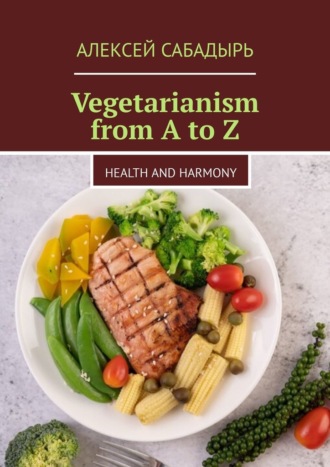
Полная версия
Vegetarianism from A to Z. Health and Harmony

Vegetarianism from A to Z
Health and Harmony
Алексей Сабадырь
Cover designer Leonardo ai
© Алексей Сабадырь, 2025
© Leonardo ai, cover design, 2025
ISBN 978-5-0062-0926-8
Created with Ridero smart publishing system
Chapter 1 – Origins of vegetarianism
The roots of vegetarianism can be traced back to ancient civilizations where the idea of abstaining from consuming animal flesh was first practiced. The concept of vegetarianism has a long and varied history, with evidence of meatless diets dating back to ancient India, Greece, and Egypt. In these early societies, the decision to forgo meat was often linked to spiritual or philosophical beliefs and was considered a means to attain a higher state of being.
In ancient India, for example, the practice of vegetarianism can be found in the religious texts of Hinduism and Jainism, where the respect for all living beings is deeply ingrained. The concept of ahimsa, or non-violence towards all living creatures, is central to the principles of these religions and is often cited as a foundational principle for vegetarianism.
In Greek philosophy, figures such as Pythagoras advocated for a meatless diet based on ethical and moral considerations. Pythagoras believed that the consumption of meat contributed to the degradation of the soul and promoted living in harmony with nature, including abstaining from the consumption of animal products.
Similarly, in ancient Egypt, evidence suggests that vegetarianism was practiced by certain sects of the population as a means to attain purity and spiritual enlightenment. The consumption of meat was often reserved for specific rituals and ceremonies, while everyday diets were predominantly plant-based.
As time progressed, the practice of vegetarianism spread and evolved, influenced by various factors such as cultural, religious, and ethical beliefs. The history of vegetarianism is rich and complex, with a tapestry of traditions and philosophies that have shaped the dietary choices of individuals and societies throughout the ages. Understanding the origins of vegetarianism provides valuable insight into the diverse and interconnected reasons for embracing a meatless lifestyle.
Chapter 2: Impact of a vegetarian diet on cardiovascular health
Cardiovascular disease is one of the leading causes of death worldwide, and numerous studies have shown that diet plays a crucial role in its development and prevention. In this chapter, we will explore the impact of a vegetarian diet on cardiovascular health, and discuss the various ways in which plant-based eating can help reduce the risk of heart disease.
The role of diet in cardiovascular health
Before delving into the specifics of how a vegetarian diet can benefit cardiovascular health, it’s important to understand the role of diet in the development of heart disease. Numerous studies have established a clear link between certain dietary patterns and the risk of cardiovascular disease. Diets high in saturated fat, trans fat, and cholesterol have been consistently associated with an increased risk of heart disease, while diets high in fruits, vegetables, whole grains, and healthy fats have been shown to have a protective effect.
The vegetarian diet, which is characterized by the absence of meat and often includes a higher intake of plant-based foods, aligns with many of the dietary patterns that have been linked to a reduced risk of heart disease. As a result, researchers have been exploring the potential cardiovascular benefits of a vegetarian diet for decades, and the evidence supporting its protective effects continues to grow.
Reducing the risk of hypertension
Hypertension, or high blood pressure, is a major risk factor for cardiovascular disease. Elevated blood pressure can strain the heart and blood vessels, leading to an increased risk of heart attack, stroke, and other cardiovascular complications. Numerous studies have shown that a vegetarian diet can help reduce the risk of hypertension and lower blood pressure levels in individuals with high blood pressure.
One of the main reasons for this is the high potassium content of many plant-based foods. Potassium is a mineral that plays a key role in regulating blood pressure by counteracting the effects of sodium. Fruits, vegetables, legumes, and whole grains are all excellent sources of potassium, and individuals who consume a vegetarian diet tend to have higher potassium intakes compared to those who eat a diet rich in animal products.
In addition to its high potassium content, the vegetarian diet also tends to be lower in sodium, which is another important factor in the development of hypertension. Processed and pre-packaged foods, which are often high in sodium, are generally avoided on a vegetarian diet, and as a result, individuals who follow a plant-based eating pattern tend to have lower sodium intakes overall.
The protective effects of a plant-based diet on cholesterol levels
Cholesterol plays a complex role in cardiovascular health, and the relationship between dietary cholesterol and blood cholesterol levels is still a topic of debate among researchers. However, numerous studies have demonstrated that the consumption of saturated and trans fats, which are abundant in animal products, can raise levels of LDL (low-density lipoprotein) cholesterol, commonly known as “bad” cholesterol. High levels of LDL cholesterol in the blood are a well-established risk factor for heart disease.
Conversely, the vegetarian diet is generally low in saturated and trans fats, and high in unsaturated fats, which have been shown to have a protective effect on heart health. Additionally, many plant-based foods, such as fruits, vegetables, nuts, seeds, and whole grains, are rich in dietary fiber, which has been shown to help lower LDL cholesterol levels. This combination of factors has led to numerous studies finding that individuals who follow a vegetarian diet tend to have lower total cholesterol levels, lower LDL cholesterol levels, and higher HDL (high-density lipoprotein) cholesterol levels, commonly known as “good” cholesterol, when compared to omnivores.
A review of 30 studies published in the journal Nutrition Reviews found that individuals who consumed a vegetarian diet had significantly lower total and LDL cholesterol levels compared to non-vegetarians, as well as lower systolic and diastolic blood pressure levels. The researchers concluded that the favorable effects of a vegetarian diet on these cardiovascular risk factors could potentially translate into a lower risk of heart disease.
Reducing inflammation and oxidative stress
Inflammation and oxidative stress are two processes that have been implicated in the development of cardiovascular disease. Chronic inflammation can damage the blood vessels and promote the formation of arterial plaques, while oxidative stress can lead to the oxidation of LDL cholesterol, which is a key step in the development of atherosclerosis, or the hardening and narrowing of the arteries.
Research has shown that the antioxidants and anti-inflammatory compounds found in many plant-based foods can help reduce inflammation and oxidative stress, which may in turn help lower the risk of heart disease. Fruits, vegetables, nuts, seeds, whole grains, and legumes are all rich sources of these beneficial compounds, and the higher intake of these foods in a vegetarian diet may offer protection against the inflammatory and oxidative processes that contribute to cardiovascular disease.
Improving endothelial function
The endothelium is the thin layer of cells that lines the inside of the blood vessels, and it plays a crucial role in regulating blood flow, blood pressure, and the formation of blood clots. Endothelial dysfunction, or damage to the endothelium, is an early step in the development of atherosclerosis and is considered a key feature of cardiovascular disease.
Several studies have demonstrated that a vegetarian diet can improve endothelial function, potentially reducing the risk of atherosclerosis and other cardiovascular complications. For example, a study published in the American Journal of Cardiology found that individuals who followed a vegetarian diet had significantly better endothelial function compared to omnivores, as evidenced by higher levels of flow-mediated dilation, a measure of how well the blood vessels expand and contract in response to changes in blood flow.
The researchers suggested that the higher intake of antioxidants and anti-inflammatory compounds found in plant-based foods, as well as the lower intake of saturated and trans fats, may explain the beneficial effects of a vegetarian diet on endothelial function. Another study, published in the European Journal of Clinical Nutrition, found that just five days of consuming a vegetarian diet led to significant improvements in endothelial function in healthy adults, further highlighting the potential impact of plant-based eating on cardiovascular health.
The impact of specific plant-based foods
While the overall dietary pattern of a vegetarian diet is clearly beneficial for cardiovascular health, specific plant-based foods have also been shown to have a particularly potent impact on reducing the risk of heart disease. For example, research has consistently demonstrated the protective effects of nuts on cardiovascular health. Nuts are rich in unsaturated fats, dietary fiber, plant sterols, and other bioactive compounds that have been shown to help lower cholesterol levels, reduce inflammation, and improve endothelial function. A review of 13 studies published in the American Journal of Clinical Nutrition found that individuals who consumed an average of 67 grams of nuts per day had a 29% reduction in the risk of heart disease compared to those who consumed no nuts. Additionally, a study published in the New England Journal of Medicine found that individuals who consumed nuts at least twice per week had a 44% lower risk of heart disease compared to those who rarely or never ate nuts.
Similarly, the consumption of whole grains, which are a staple of the vegetarian diet, has been linked to a reduced risk of heart disease. Whole grains are rich in dietary fiber, vitamins, minerals, and phytochemicals, all of which have been shown to have protective effects on cardiovascular health. A meta-analysis of 45 studies published in the journal Circulation found that individuals who consumed a high intake of whole grains had a 21% lower risk of heart disease compared to those who consumed a low intake of whole grains.
Finally, the inclusion of soy-based foods in the vegetarian diet has also been associated with a reduced risk of heart disease. Soy is rich in isoflavones, which are plant compounds with estrogen-like properties that have been shown to have a beneficial effect on cholesterol levels and endothelial function. A review of 38 studies published in the Journal of Nutrition found that the consumption of soy protein reduced LDL cholesterol levels by 3—4% compared to animal protein, and a meta-analysis of 46 clinical trials published in the Journal of the American Heart Association found that soy isoflavones were associated with significant improvements in endothelial function.
In sum, the vegetarian diet, with its emphasis on plant-based foods and the exclusion of meat, offers numerous benefits for cardiovascular health. Research has consistently shown that individuals who follow a vegetarian diet tend to have lower blood pressure, lower cholesterol levels, reduced inflammation and oxidative stress, improved endothelial function, and a reduced risk of heart disease compared to their omnivorous counterparts. Additionally, specific plant-based foods, such as nuts, whole grains, and soy, have been shown to have particularly potent effects on reducing the risk of heart disease when included as part of a vegetarian eating pattern.
It’s important to note that the benefits of a vegetarian diet for cardiovascular health are not solely due to the absence of meat, but rather the abundance of plant-based foods in the diet. Individuals who follow a vegetarian diet often consume higher amounts of fruits, vegetables, whole grains, nuts, seeds, and legumes, all of which have been shown to have protective effects on heart health. As a result, it’s not simply enough to eliminate meat from the diet; rather, it’s important to focus on consuming a wide variety of nutrient-dense plant-based foods in order to maximize the cardiovascular benefits of a vegetarian eating pattern.
In the next chapter, we will explore the impact of a vegetarian diet on weight management and the prevention of obesity, an important topic given the global rise in overweight and obesity rates. We will discuss the potential mechanisms by which a plant-based diet can help individuals achieve and maintain a healthy weight, and review the latest research on the association between the vegetarian diet and body weight.
Chapter 3: The Impact of vegetarianism on the environment
The global food industry is a major driver of environmental degradation, accounting for roughly 25% of all anthropogenic greenhouse gas (GHG) emissions (1). Livestock agriculture, in particular, is a primary source of GHGs, which contribute to climate change. The production of meat and dairy contributes significantly to deforestation, soil degradation, and water pollution. However, adopting a vegetarian or vegan diet can have a positive impact on the environment. In this chapter, we will explore the environmental implications of vegetarianism and veganism and their ethical considerations.
Climate change and greenhouse gas emissions
The World Health Organization (WHO) has estimated that the livestock sector’s contribution to global warming is approximately 14.5%, higher than transportation. The production of beef is responsible for 41% of livestock’s greenhouse gas emissions, while dairy and other cattle contribute to around 20% (2). In contrast, plant farming is responsible for a much smaller proportion of GHG emissions. Therefore, reducing or altogether eliminating meat and dairy consumption is one of the most effective ways to lower carbon footprint.
Конец ознакомительного фрагмента.
Текст предоставлен ООО «Литрес».
Прочитайте эту книгу целиком, купив полную легальную версию на Литрес.
Безопасно оплатить книгу можно банковской картой Visa, MasterCard, Maestro, со счета мобильного телефона, с платежного терминала, в салоне МТС или Связной, через PayPal, WebMoney, Яндекс.Деньги, QIWI Кошелек, бонусными картами или другим удобным Вам способом.









